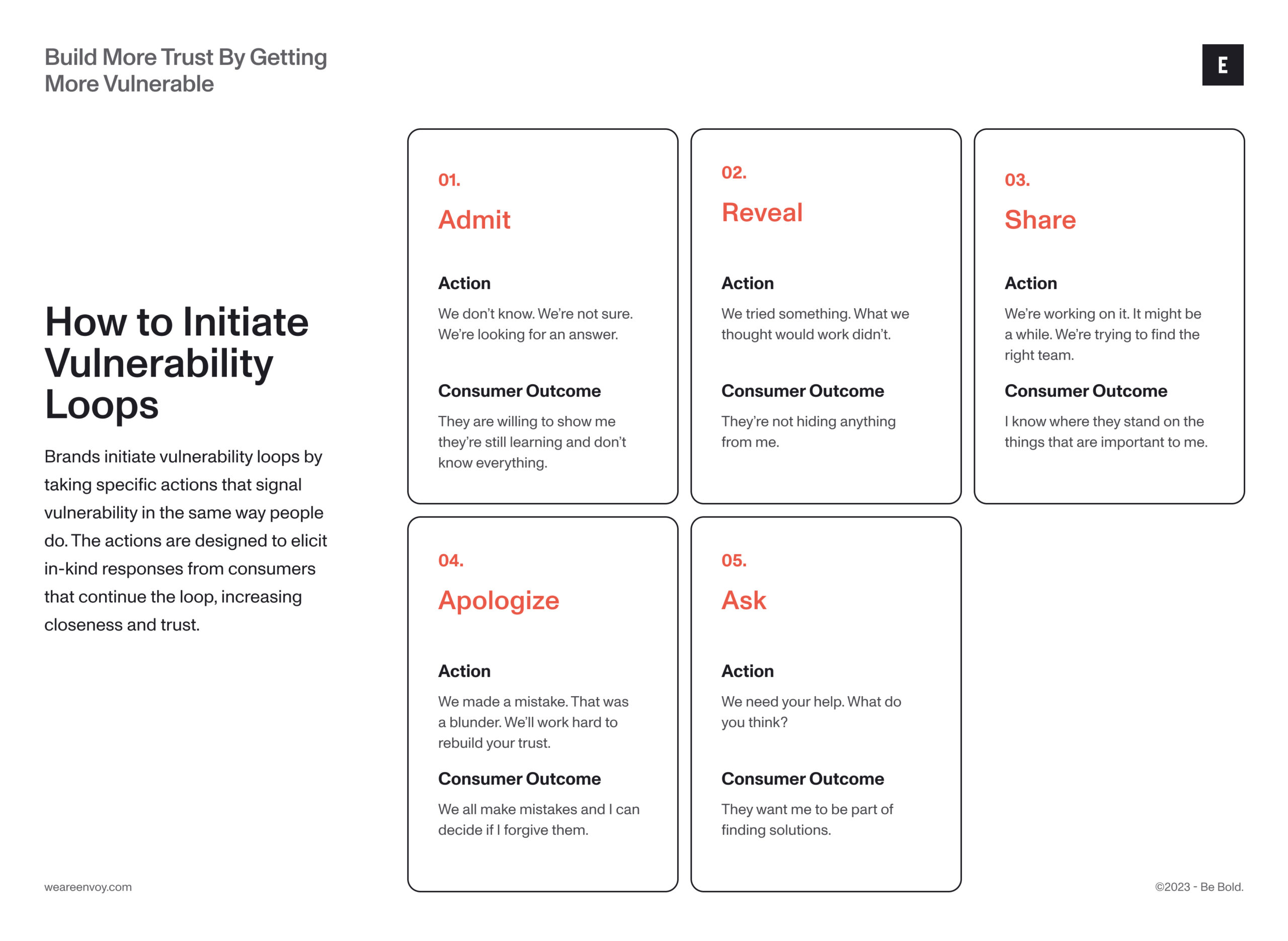Get More Vulnerable, Build More Trust.
March 18, 2024
“There’s a crack in everything, that’s how the light get’s in.”
-Leonard Cohen
People trust businesses more than they ever have. The 2024 Edleman Global Trust Barometer, which was recently unveiled at Davos, confirmed what we’ve seen happening in real-time at Envoy. Across the world, people now look at for-profit businesses as the most competent and ethical institutions—a full 52 points more competent and 32 percent more ethical than governments.
For this discussion, let’s assume people’s recent increase of trust in businesses is not because businesses necessarily deserve that trust, but because these same people believe other institutions deserve it less. If that’s true, then businesses are going to have to live into and live up to the trust that’s been granted.
People Build Trust By Being Vulnerable
We all know this anecdotally. The people we trust most in our personal lives are the ones who reveal meaningful truths about themselves, share their mistakes, apologize for missteps and ask for help.
A simple act of vulnerability can initiate a vulnerability loop resulting in a shared sense of closeness and eventually trust. Dr. Jeff Polzer, professor of organizational behavior at Harvard University, demonstrates the loop in very simple terms:
- Person A sends a signal of vulnerability
- Person B detects this signal
- Person B responds by signaling his or her vulnerability
- Person A detects this signal
- A new norm is established where closeness and trust increase.
The highest-performing organizations provide additional evidence for the power of vulnerability loops to build trust.
While Navy SEALs may not be immediately synonymous with vulnerability loops, the reality is that their ability to perform in the highest-risk environments is rooted in the trust they build through extreme vulnerability. In BUD/S, candidates have to struggle and fail in front of each other. There is no hiding what’s hard, what you can’t do, and what you don’t know. That culture extends once candidates make it through. In The Culture Code SEAL Master Chief Dave Cooper explained “The most important words a leader can say is “I screwed that up.” By exposing his vulnerability on and off the battlefield Cooper continues to reinforce the vulnerability loop initiated during BUD/s and increase the closeness and trust needed for SEAL teams’ success.
Or take Alcoholics Anonymous as a very different yet equally high-efficacy organization that provides similar evidence. As a new member of AA you aren’t expected to share first. Instead, you hear other members of AA tell their stories and talk about their struggles which inevitably in some way reflect yours. The incredibly simple mechanics of being privy to hearing another person go first, and disclose things that you’ve been hesitant to disclose, builds the trust needed to know it’s OK to reveal the most difficult parts of your life to this supportive group of people. It’s a trust loop that begins when you first join AA and is reinforced through the organization’s lifetime group membership and one-on-one sponsorship.
To Be Vulnerable, You Have To Embrace Imperfection
We can’t possibly initiate a vulnerability loop if we’re trying to be perfect. Do recruits in BUD/S, Navy SEALs, or AA members risk something by putting their imperfections out there? Of course they do. With this vulnerability comes potential critique, backlash and rejection. But they all decide that trying to be perfect isn’t worth the chance of losing out on building close and trusted relationships with the essential people around them.
The same goes for brands.
When we started working with CPG brands over 20 years ago, they were imperfect. But walk into any Whole Foods or flip around on ThriveMarket.com and it’s hard to find an imperfect brand anywhere. Spending a few minutes on Pop Up Grocer’s site is instructive. They are a curator of the brands that are, in their words, “new and interesting”, “made responsibility” and “look good”. Every brand that makes it into their store has a design that’s on point, values that are real, social good that’s quantified, product innovations that are on trend and activations that are cheeky and bite-sized to influence the social conversation. The problem is that in striving to be perfect (or at least not imperfect) they lose out on the chance to initiate vulnerability loops. In practice, this means they are giving up the far bigger reward of building closer and more trusted relationships with their consumers.
“Normally, we think about trust and vulnerability the way we think about standing on solid ground and leaping into the unknown: First, we build trust, then we leap. But science is showing us that we’vve got it backward. Vulnerability doesn’t come after trust– it precedes it.”
– Daniel Coyle, author of The Culture Code
We’re going to be vulnerable here too. Over the last two decades we’ve been part of building countless incredible brands consumers would be hard-pressed to find a crack in. But as we look to the future of CPG brands, we know the next frontier is helping them break through the perfection they’ve presented so they can live into and live up to the trust that consumers are putting in them.
How To Initiate Vulnerability Loops
Brands initiate vulnerability loops by taking specific actions that signal vulnerability in the same way people do. The actions are designed to elicit in-kind responses from consumers that continue the loop, increasing closeness and trust.
SIGNAL #1: ADMIT
ACTIONS: We don’t know. We’re not sure. We’re looking for an answer.
CONSUMER OUTCOME: They are willing to show me they’re still learning and don’t know everything.
SIGNAL #2: REVEAL
ACTIONS: We tried something. What we thought would work didn’t.
CONSUMER OUTCOME: They’re not hiding anything from me.
SIGNAL #3: SHARE
ACTIONS: We’re working on it. It might be a while. We’re trying to find the right team.
CONSUMER OUTCOME: I know where they stand on the things that are important to me.
SIGNAL #4: APOLOGIZE
ACTIONS: We made a mistake. That was a blunder. We’ll work hard to rebuild your trust.
CONSUMER OUTCOME: We all make mistakes and I can decide if I forgive them.
SIGNAL #5: ASK
ACTIONS: We need your help. What do you think?
CONSUMER OUTCOME: They want me to be part of finding solutions.

Vulnerability (And Invulnerability) Loops In Action
You might remember when Tim Cook apologized for Apple Maps in 2012. In the letter that posted to Apple’s website he said “At Apple, we strive to make world-class products that deliver the best experience possible to our customers. With the launch of our new Maps last week, we fell short on this commitment. We are extremely sorry for the frustration this has caused our customers and we are doing everything we can to make Maps better.” Apple just recently exited the autonomous car market. This time we don’t know because of a letter. We know because of a memo leaked to the New York Times. What a miss. Given the importance of the potential market entry, Apple could have used this moment to initiate a vulnerability loop by admitting they were exiting and sharing why that decision was made to build more connection and trust.
Jimmy Donaldson—most commonly known as Mr. Beast—represents the other side of the coin. He and his team recently relaunched their snack brand Feastables with new product formulations, new packaging and new names. Using all of his social channels to talk directly to his almost 250 million followers he openly shared that his old chocolate bars weren’t nearly as good as his new ones, explained that he had to drop the beloved Dez Nuts chocolate bar name over trademark issues, asked people look for the new packaging and apologized if they couldn’t find the new bars while they’re restocking shelves. The result? While we don’t have hard data, we would guess that Donaldson’s millions of fans feel closer to him, closer to Feastables and trust the brand far more than they did before.
The Risk Is Worth The Reward
At Envoy we believe that there’s almost all upside on the other side of vulnerability, even if it comes with some trepidation at first. If governments and other institutions continue to lose our trust, it’s imperative that brands continue to live into and live up to the trust that’s being placed in them. If you’re brave and willing, we’d love to explore this new frontier with you.

